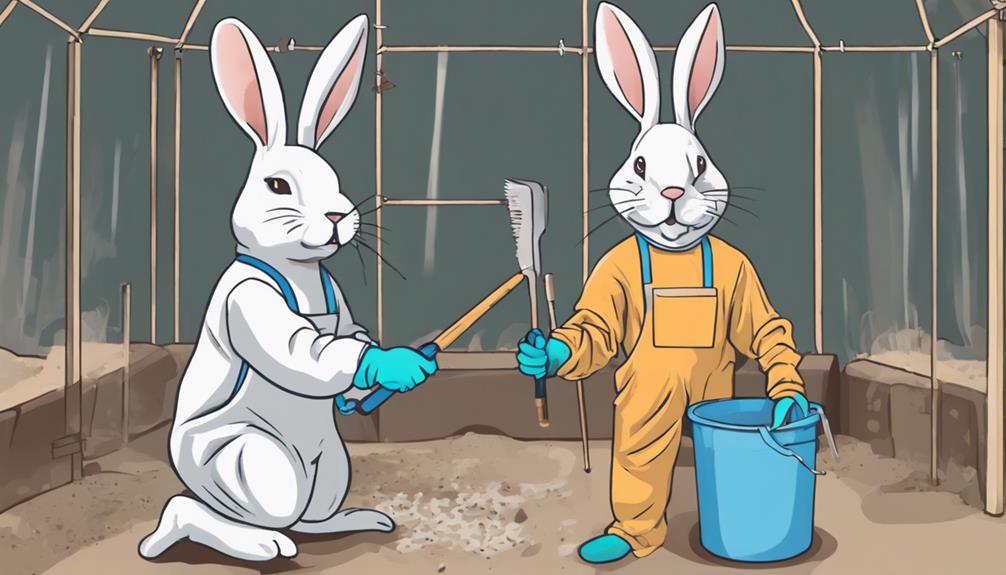10 Best Methods to Ward Off Rabbit Diseases
When it comes to safeguarding your rabbits against diseases, prevention is worth a pound of cure. But how do you ensure your fluffy companions stay healthy and happy for the long haul?
By exploring the ten best methods to ward off rabbit diseases, you can equip yourself with the knowledge and strategies needed to proactively protect your beloved pets.
From simple hygiene practices to specialized veterinary care, each method plays a crucial role in maintaining your rabbits' well-being.
So, are you ready to discover the secrets to keeping your furry friends in the pink of health?
Understanding Rabbit Diseases
To effectively protect your rabbits from illnesses, it's crucial to understand the various diseases that can affect them. Preventive care plays a vital role in keeping your rabbits healthy. By being aware of common diseases and practicing good disease management, you can significantly reduce the risk of your rabbits falling ill.
One essential aspect of preventive care is vaccination. Vaccines can help protect your rabbits from serious diseases such as viral hemorrhagic disease and myxomatosis. Consult with your veterinarian to develop a vaccination schedule tailored to your rabbits' specific needs. Additionally, regular check-ups can aid in the early detection of any potential health issues, allowing for prompt intervention.
Another key component of disease management is maintaining a clean living environment for your rabbits. Proper hygiene practices, such as regularly cleaning cages, providing fresh bedding, and ensuring access to clean water, can help prevent the spread of diseases. Implementing quarantine procedures for new rabbits before introducing them to your existing ones can also help prevent the transmission of any contagious illnesses.
Proper Hygiene Practices
Maintaining a clean living environment for your rabbits is essential in preventing the spread of diseases. Hygiene maintenance and high cleanliness standards are crucial to ensure your rabbits stay healthy and happy.
Here are some key practices to help you establish a hygienic environment for your beloved pets:
- Regular Cage Cleaning: Make sure to clean your rabbits' cages frequently to remove any waste or soiled bedding. A clean cage will help prevent the buildup of bacteria and parasites.
- Fresh Water Supply: Always provide your rabbits with fresh, clean water. Water should be changed daily to prevent contamination and ensure your rabbits stay hydrated.
- Proper Waste Disposal: Dispose of your rabbits' waste properly and promptly. Regularly remove soiled bedding and droppings from the cage to maintain a clean living space.
- Grooming Routine: Incorporate regular grooming into your rabbits' care routine. Brushing your rabbits helps prevent matted fur, reduces shedding, and allows you to check for any signs of skin issues or parasites.
Balanced Diet Importance
Ensuring your rabbits have a balanced diet is crucial for their overall health and well-being. A balanced diet provides essential nutrients that support your rabbits' growth, energy levels, and immune system. When formulating your rabbits' diet, it's important to include a variety of fresh hay, vegetables, fruits, and high-quality pellets. These components offer a range of vitamins, minerals, and fiber necessary for your rabbits' well-being.
One key aspect of a balanced diet is maintaining digestive health. Fiber-rich foods like hay are vital for supporting your rabbits' digestive system. They help prevent issues like gastrointestinal stasis, a common problem in rabbits. Additionally, ensuring your rabbits have access to clean water at all times is crucial for proper digestion and overall health.
In some cases, your rabbits may benefit from nutritional supplements to address specific needs. However, it's essential to consult with a veterinarian before introducing any supplements to ensure they're safe and appropriate for your rabbits' diet. Understanding your rabbits' nutritional requirements and providing a well-rounded diet is essential for preventing diseases and promoting longevity.
Regular Veterinary Check-ups
Regular veterinary check-ups play a vital role in ensuring your rabbits' health and catching any potential issues early on. Preventive care is key to maintaining your rabbits' well-being, and regular visits to the vet are a crucial part of their health maintenance routine. During these check-ups, your veterinarian will conduct thorough examinations to assess your rabbits' overall health and detect any signs of illness. In addition to this, they'll provide you with valuable information on how to better care for your rabbits and prevent diseases.
By scheduling regular veterinary check-ups for your rabbits, you're taking proactive steps towards keeping them healthy and happy. Here are some benefits of these routine visits:
- Early Detection: Regular check-ups can help in the early detection of any underlying health issues, allowing for prompt treatment.
- Vaccinations: Your veterinarian can ensure that your rabbits are up to date on necessary vaccinations to protect them from common diseases.
- Dietary Advice: Your vet can provide guidance on the best diet for your rabbits' specific needs, promoting their overall health.
- Parasite Prevention: Regular check-ups can help in preventing and treating parasites that can harm your rabbits' health.
Make sure to schedule regular veterinary check-ups for your rabbits to provide them with the best preventive care and health maintenance possible.
Providing Adequate Exercise
To ensure your rabbits' overall well-being and health, it's essential to incorporate adequate exercise into their daily routine. Indoor playtime and outdoor exploration are crucial for keeping your rabbits active and healthy. Providing opportunities for exercise not only helps in maintaining a healthy weight but also promotes mental stimulation and prevents boredom.
Indoor playtime is a great way to keep your rabbits active, especially during times when outdoor exploration may not be possible. You can create a safe and rabbit-proofed area within your home where they can roam freely. Encourage activities like hopping, running, and exploring tunnels or toys to keep them engaged and physically active.
Outdoor exploration is equally important for your rabbits to experience the natural environment and get some fresh air and sunlight. Ensure the outdoor area is secure from predators and escape routes. Supervise your rabbits while they enjoy outdoor time to prevent them from consuming anything harmful.
Rotate between indoor playtime and outdoor exploration to provide variety in their exercise routine. Remember, regular exercise is essential for your rabbits' physical health and mental well-being. By incorporating both indoor and outdoor activities into their daily schedule, you can help ward off diseases and ensure a happy, healthy life for your beloved pets.
Stress Reduction Techniques
One effective way to help your rabbits manage stress levels is by implementing calming activities into their daily routine. Stress management is crucial for maintaining your rabbits' overall well-being.
Here are some relaxation techniques you can incorporate to reduce stress in your rabbits:
- Provide Enrichment Activities: Engage your rabbits with toys, tunnels, or puzzle feeders to stimulate their minds and keep them active. This can help reduce boredom and stress.
- Create a Quiet Environment: Rabbits are sensitive to loud noises and sudden movements. Ensure their living space is peaceful and free from disturbances to promote relaxation.
- Establish a Routine: Rabbits thrive on predictability. Set a consistent daily schedule for feeding, playtime, and rest to give them a sense of security and stability.
- Offer Gentle Petting and Bonding Time: Spending quality time with your rabbits through gentle petting or cuddling can strengthen your bond and help them feel safe and loved. This physical interaction can be soothing for both you and your rabbits.
Quarantine New Additions

Implementing a quarantine period for new additions is essential to prevent the spread of diseases among your rabbit population. When introducing a new rabbit to your existing group, it's crucial to isolate the newcomer for a period of time to ensure they're healthy and free from any potential illnesses. By following proper isolation protocols, you can safeguard your current rabbits from contracting any contagious diseases that the new rabbit may be carrying.
During the quarantine period, it's vital to adhere to strict isolation protocols. This includes housing the new rabbit in a separate area away from your established rabbits to prevent any direct or indirect contact. This isolation allows you to closely monitor the health of the new addition without risking the health of your current rabbit population. Regular health monitoring during this time is essential to detect any signs of illness early on.
Implementing Parasite Control
When managing parasite control for your rabbits, focus on regular monitoring and preventative measures to ensure their health and well-being. Parasites can pose a significant threat to your rabbits' health, so being proactive is key.
Here are some essential tips for implementing parasite control effectively:
- Maintain a Clean Living Environment: Regularly clean and disinfect your rabbits' living spaces to prevent parasites from thriving.
- Routine Veterinary Check-ups: Schedule regular check-ups with your veterinarian to monitor your rabbits' health and address any potential parasite issues promptly.
- Parasite Prevention Products: Use parasite prevention products recommended by your vet, such as topical treatments or oral medications, to protect your rabbits from infestations.
- Treatment Options: In case your rabbits do get infected with parasites, discuss treatment options with your vet. They can recommend the most suitable treatment to eliminate the parasites and ensure your rabbits' health.
Frequently Asked Questions
Can Rabbits Transmit Diseases to Other Household Pets?
Rabbits can transmit diseases to other household pets through close contact. Their behavior and interactions with other animals can facilitate the spread of illnesses. To prevent this, it's essential to practice good pet care and prevention techniques.
Regularly cleaning their living space, ensuring all pets are up to date on vaccinations, and keeping them separate if needed can help reduce the risk of disease transmission among household pets.
Are There Any Specific Breeds of Rabbits That Are More Prone to Certain Diseases?
When it comes to breeds susceptibility and genetic predisposition, certain rabbit breeds may indeed be more prone to specific diseases. Factors like genetics, breeding practices, and environmental conditions can all play a role in determining a rabbit's likelihood of developing certain health issues.
Being aware of these breed-specific tendencies can help you take proactive steps to prevent and manage potential diseases in your furry friend.
What Are Some Common Symptoms of Stress in Rabbits That May Indicate a Potential Health Issue?
If you notice signs of stress in your rabbit, it's crucial to pay attention as they could indicate underlying health issues. Common symptoms of stress in rabbits include:
- Reduced appetite
- Excessive grooming
- Aggression
- Hiding
By being vigilant and addressing these signs promptly, you can detect potential health problems early and ensure your rabbit's well-being.
How Can I Prevent My Rabbit From Becoming Overweight and Developing Related Health Problems?
To prevent your rabbit from becoming overweight and developing health problems, you should focus on preventive measures. Ensure your bunny has a balanced diet and limit treats.
Encourage regular exercise routines like hopping around or playing with toys. Monitor their weight and adjust their food intake accordingly.
Are There Any Natural Remedies or Supplements That Can Help Boost a Rabbit's Immune System and Prevent Diseases?
If you're looking to give your rabbit's immune system a boost and prevent diseases, consider incorporating herbal remedies and supplements into their diet. These can provide natural support for their health and well-being.
Additionally, prevention techniques like ensuring a clean living environment, providing a balanced diet, and regular vet check-ups can also help keep your rabbit healthy and strong.
Conclusion
Overall, by following these 10 methods to ward off rabbit diseases, you can ensure that your furry friends stay healthy and happy.
Remember to keep their living environment clean, provide them with a balanced diet, and schedule regular vet check-ups. Additionally, make sure they get enough exercise, reduce stress levels, and quarantine new additions.
By implementing parasite control measures, you can help prevent common rabbit diseases and keep your rabbits thriving for years to come.
